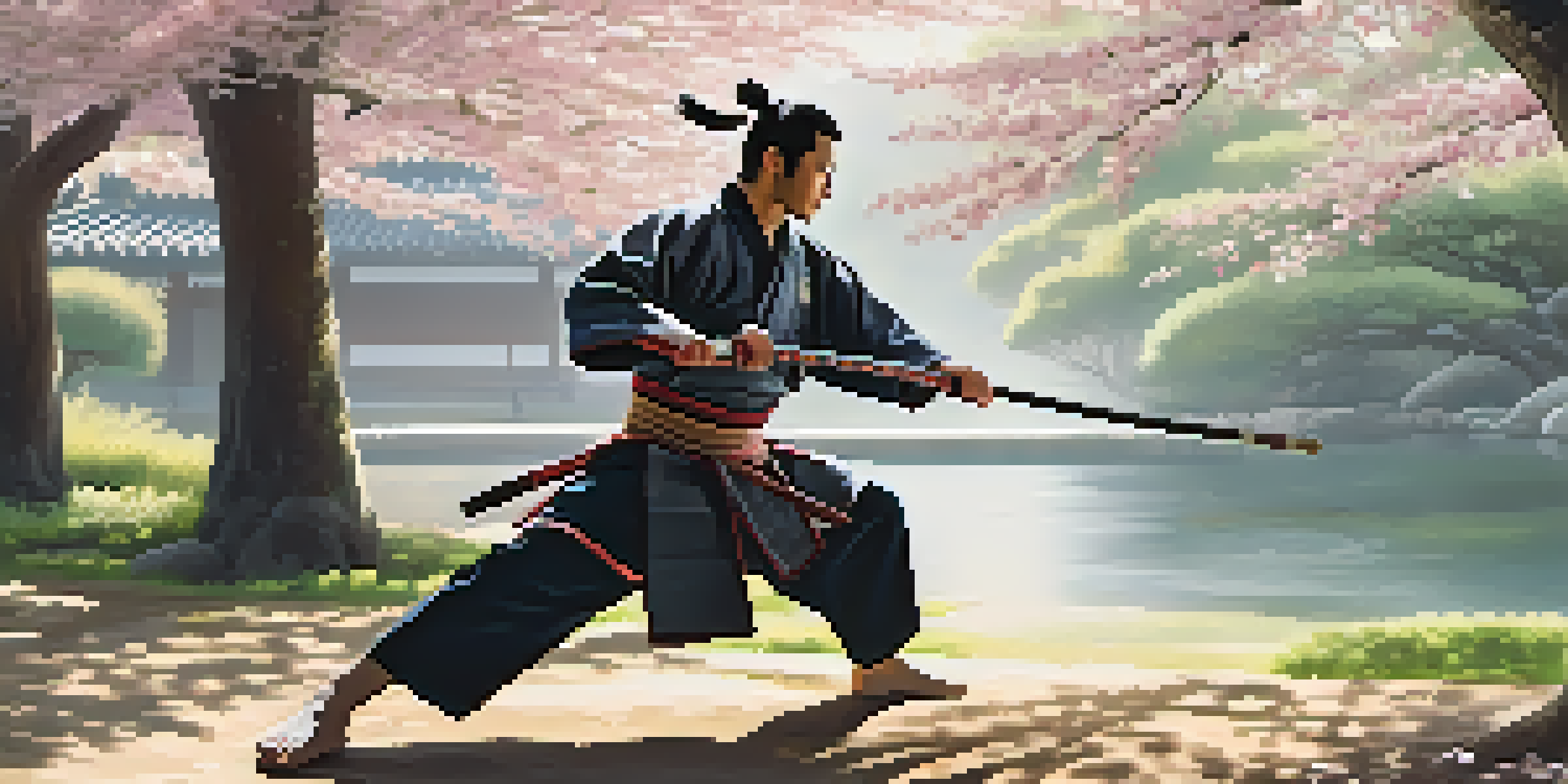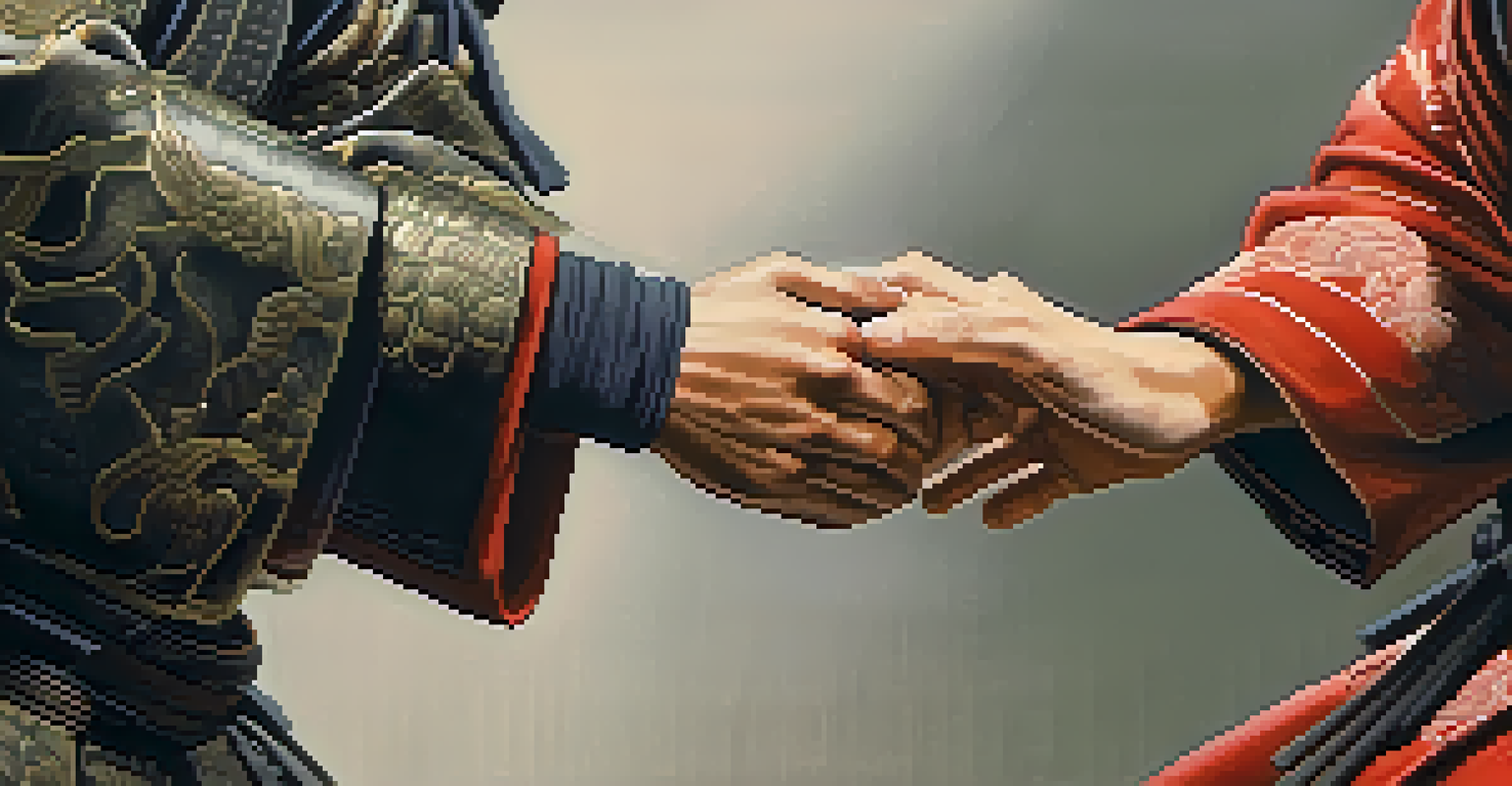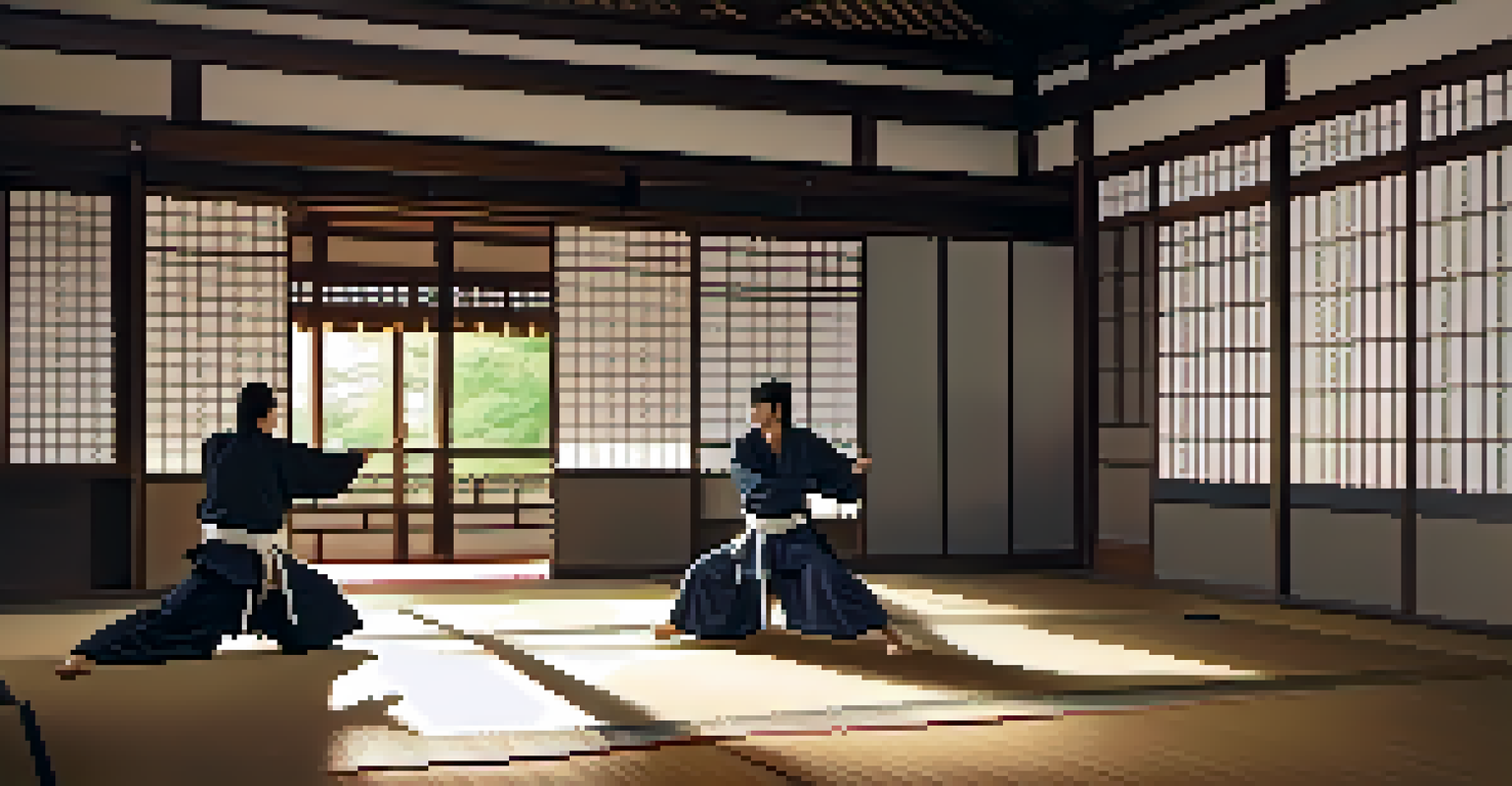The Role of Jujutsu in Samurai Warfare Techniques

Understanding Jujutsu: A Foundation for Samurai Combat
Jujutsu, a Japanese martial art, emphasizes using an opponent's force against them. This principle aligns perfectly with the samurai's need for efficiency in combat, especially when faced with armed adversaries. The art focuses on joint locks, throws, and grappling techniques, offering samurai a versatile skill set that complemented their traditional weaponry. By mastering jujutsu, samurai could neutralize threats without relying solely on swords or spears, making them adaptable warriors.
The ultimate aim of martial arts is not having to use them.
In samurai culture, the philosophy behind jujutsu was equally important as the physical techniques. The mental discipline required in jujutsu training fostered a mindset of calmness and focus, crucial attributes for samurai on the battlefield. This psychological aspect helped warriors remain composed under pressure, allowing them to make strategic decisions in the heat of combat. Thus, jujutsu was not just a fighting style; it was a way of life for the samurai.
Furthermore, the incorporation of jujutsu into samurai training showcased the evolution of martial techniques over time. As warfare advanced and the battlefield became more dynamic, the need for grappling arts like jujutsu became evident. Samurai began to integrate these techniques into their overall combat strategies, blending them with their traditional skills to create a more holistic approach to warfare.
The Historical Context of Samurai Warfare
To appreciate jujutsu's role, we must first understand the historical context of samurai warfare. The samurai class emerged during Japan's feudal period, where honor, loyalty, and combat skills were paramount. Battles were often fought in close quarters, making grappling and disarming techniques essential for survival. As a result, jujutsu naturally found its way into the samurai's arsenal, offering a practical solution for unarmed combat situations.

Additionally, the shift from large-scale battles to more personal, one-on-one duels further highlighted the importance of jujutsu. In such encounters, a samurai's ability to control and submit an opponent could mean the difference between life and death. This necessity for close combat proficiency drove many samurai to delve deeper into jujutsu techniques, refining their skills in grappling and joint manipulation.
Jujutsu: Samurai's Versatile Tool
Jujutsu provided samurai with essential techniques like throws and joint locks, allowing them to adapt and neutralize threats effectively.
Moreover, the influence of Chinese martial arts and the introduction of new weapons also played a significant role in shaping samurai combat strategies. As samurai encountered different fighting styles, they began to adapt their techniques, incorporating elements from jujutsu to address the challenges presented by these new methods. This adaptability not only enhanced their combat effectiveness but also enriched the samurai's martial tradition.
Core Techniques of Jujutsu in Samurai Training
Jujutsu encompasses a variety of techniques, many of which were crucial for samurai training. Key techniques include throws, joint locks, and pins, all designed to subdue an opponent effectively. For instance, a well-executed throw could allow a samurai to gain the upper hand by using their opponent’s momentum against them. This strategic use of leverage was integral to samurai combat, especially in situations where they faced multiple attackers.
In the midst of chaos, there is also opportunity.
Joint locks were another essential aspect of jujutsu, providing samurai with the means to control an adversary without causing fatal harm. This technique allowed samurai to capture and disarm opponents, showcasing their skills while adhering to the code of honor that governed their conduct in battle. By mastering these techniques, samurai could incapacitate foes while minimizing unnecessary violence, reflecting their warrior ethos.
Lastly, the practice of ground fighting in jujutsu prepared samurai for unexpected encounters. In the chaos of battle, a warrior could find themselves on the ground, making it vital to know how to defend against or counter an opponent's attack from this position. Jujutsu's focus on grappling ensured that samurai were well-rounded fighters, capable of handling various combat scenarios with confidence.
The Influence of Jujutsu on Samurai Ethics and Philosophy
Jujutsu not only shaped samurai techniques but also influenced their ethical framework. The principles of jujutsu emphasize respect for opponents and self-discipline, which resonated deeply with the samurai's bushido code. This connection reinforced the idea that true strength lies not just in physical prowess but also in moral character, a notion that was central to samurai identity.
Moreover, the practice of jujutsu encouraged samurai to adopt a mindset of humility and learning. By engaging with a martial art that prioritized technique over brute strength, warriors were reminded of the importance of continuous improvement and adaptation. This philosophy fostered a culture of mentorship within the samurai class, where experienced fighters shared their knowledge with novices, ensuring the preservation and evolution of martial skills.
Philosophy Beyond Combat Techniques
The mental discipline of jujutsu fostered a mindset of calmness and focus, aligning with the samurai's bushido code of honor and ethical conduct.
Additionally, the ethical implications of jujutsu training extended beyond the battlefield. Samurai who practiced jujutsu were often seen as protectors of the weak, using their skills responsibly to uphold justice. This commitment to ethical conduct in martial arts contributed to the samurai's enduring legacy as both formidable warriors and honorable individuals, shaping the cultural narrative of Japan.
Jujutsu's Evolution and Its Impact on Samurai Warfare
As Japan transitioned through various historical periods, jujutsu evolved, reflecting changes in warfare and society. During the Edo period, for instance, the need for combat techniques diminished due to relative peace. In this context, jujutsu became less about battlefield survival and more about personal development and discipline. Samurai began to focus on the art itself, leading to the formation of various schools that practiced distinct styles of jujutsu.
This evolution also had implications for samurai training. With the decline of active warfare, many samurai sought to refine their skills through formalized training in jujutsu schools. These institutions emphasized not only the physical aspects of the art but also its philosophical teachings, ensuring that the values of honor and respect remained central to samurai life even in times of peace.
As a result, jujutsu became a cornerstone of samurai education, influencing subsequent generations of martial artists. The techniques and philosophies developed during this period laid the groundwork for modern Japanese martial arts, demonstrating how jujutsu's influence extended far beyond the battlefield. Today, practitioners of jujutsu continue to honor this rich heritage, embodying the spirit of the samurai.
Modern Interpretations of Jujutsu and Samurai Influence
In contemporary martial arts, the legacy of jujutsu and its connection to samurai warfare is still very much alive. Many modern styles, such as Brazilian Jiu-Jitsu, draw upon the principles and techniques established by traditional jujutsu. These styles emphasize ground fighting and leverage, showcasing how samurai innovations continue to shape martial arts today. This connection illustrates the timeless nature of these techniques, proving their effectiveness in various combat scenarios.
Moreover, the samurai ethos of discipline and respect remains a guiding principle for many martial artists. Practitioners often find inspiration in the samurai's commitment to self-improvement and ethical conduct, striving to embody these values in their training. This cultural exchange enriches the practice of jujutsu, allowing it to evolve while still honoring its roots in samurai tradition.
Enduring Legacy of Jujutsu Today
Modern martial arts continue to be influenced by jujutsu, showcasing its timeless techniques and the samurai ethos of discipline and respect.
Additionally, modern self-defense systems have also integrated jujutsu techniques, recognizing their practical applications in real-world scenarios. By adapting traditional methods to contemporary needs, martial artists ensure that the essence of jujutsu remains relevant. Ultimately, the influence of samurai warfare techniques on jujutsu continues to resonate, bridging the past and present in the world of martial arts.
Conclusion: Jujutsu's Enduring Legacy in Samurai Culture
In conclusion, jujutsu played a pivotal role in shaping samurai warfare techniques and their broader cultural ethos. From its practical applications in combat to its philosophical teachings, jujutsu provided samurai with a comprehensive toolkit for both martial and personal development. Through the integration of jujutsu into their training, samurai not only enhanced their combat effectiveness but also cultivated a sense of honor and discipline that defined their identity.
The historical significance of jujutsu in samurai warfare underscores the art's adaptability and resilience. As martial arts evolved over centuries, the principles established by the samurai continue to influence modern practitioners, highlighting the timeless nature of these techniques. The legacy of jujutsu serves as a reminder of the rich cultural heritage of Japan and the enduring impact of the samurai's martial traditions.

Ultimately, the study of jujutsu and its relationship with samurai warfare offers valuable insights into the intersection of combat and philosophy. By recognizing the importance of both technique and ethics, we can appreciate the depth of this martial art and its ongoing relevance in today's world. Jujutsu remains a testament to the samurai's enduring spirit and their commitment to excellence in all aspects of life.